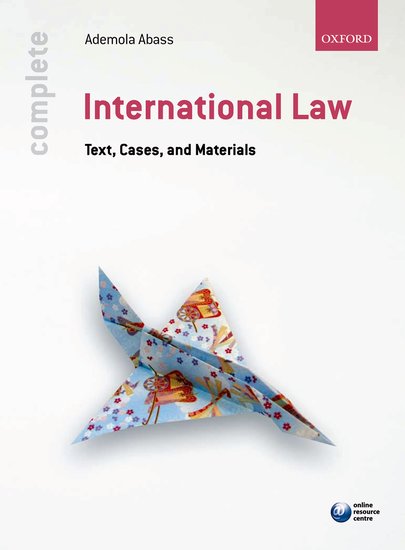For the first time in its history, the American Society of International Law (ASIL) is partnering with the American Branch of the International Law Association (ILA) to combine each organization’s major conference into an extraordinary joint event. Oxford University Press is looking forward to exhibiting at the conference taking place in Washington on 7-12 April 2014. The conference theme is “The Effectiveness of International Law,” and no doubt there will be much to debate and discuss during the week. Organizers released a set of questions they hope will be addressed during the course of the conference. To kick off the debate we posed two of them to Ademola Abass, author of Complete International Law.
Are there greater challenges to effectiveness in some areas of international law practice than in others? If so, what are they, and how can they be addressed?
Keen followers of international affairs often wonder why, despite the prohibition on the use of force by the UN Charter, States still resort to this means of addressing international disputes. Explanations vary. Legal experts offer various technical explanations for this development. This includes that the rules governing the use of force are outdated and do not offer enough protection for States. Non-lawyers blame the ‘double-standard’ of international law which allows rich and powerful States to act with impunity while weak and poor States are held accountable for their conducts. Others blame the special status accorded to the five permanent members of the Security Council by the veto vote. Regardless of divergent viewpoints, all agree the prohibition of the use of force is less effective than other areas of international law. This is due principally to lack of compliance by some States, and lack of enforcement against rich and powerful States. It is also difficult for States not to defend themselves against threatening States until those have attacked them. The presence of nuclear weapons makes it difficult for most States to sit and wait for an attack before they respond. Overcoming these challenges requires making the Security Council work more evenly and responsibly; ensuring greater transparency and consistency in the administration of collective security by the United Nations. More importantly, it requires the interpretation of the law prohibiting the use of force in accordance with the reality of the twenty first century.

Do the challenges facing international law vary in different parts of the world, and, if so, how might those challenges be met?
It is often argued that international law began in the West. While one can contest whether it is possible (or purposeful) to seek locating the birthplace of international law, in contradistinction from its development, not many will argue that international law faces severe challenges in the developing world in contrast to the developed world. In the developing world, the first problem of international law is lack of its popularity. This arises through a combination of lack of awareness, of most law students, about the utility and relevance of international law to their societies. Secondly, the marketing of international institution and materials, has almost a Western bias: international institutions such as the United Nations, the International Court of Justice, the International Criminal Court (ICC), World Bank, are all located in the West. Most international law books report cases and jurisdictions that are preponderant Western as if cases and courts in developing countries make no contribution to international law development.
Addressing these challenges calls for a greater balancing acts in the citing and administration of international institutions; it requires a more even coverage of international law; it necessitates making international law more visible to developing countries, and making their contributions to international law more visible to the world. On their own, developing countries must do more to popularize international law in their academic curricula, expose their judges more greatly to international law, and afford international lawyers from the developing countries more opportunity in the dissemination and practice of international law.
Professor Ademola Abass joined the UNU Institute on Comparative Regional Integration Studies (UNU-CRIS) as a Research Fellow in Peace and Security in 2010. He is also the Head of Peace and Security Programme. He is a former Professor of International Law and Organisation at Brunel University, West London and was educated at the Universities of Lagos, Cambridge, and Nottingham. He holds a Ph.D. in International Law and has previously taught in several British universities. He is the author of Complete International Law.
Oxford University Press is a leading publisher in international law, including the Max Planck Encyclopedia of Public International Law, latest titles from thought leaders in the field, and a wide range of law journals and online products. We publish original works across key areas of study, from humanitarian to international economic to environmental law, developing outstanding resources to support students, scholars, and practitioners worldwide. For the latest news, commentary, and insights follow the International Law team on Twitter @OUPIntLaw.
Subscribe to the OUPblog via email or RSS.
Subscribe to only law articles on the OUPblog via email or RSS.
Image credit: The United Nations Security Council Chamber in New York. Photo by Patrick Gruban, 2006. CC-BY-SA-2.0 via Wikimedia Commons.


[…] In line with the theme of ASIL-ILA, which focused on the effectiveness of international law, we asked our contributors, “Are there greater challenges to effectiveness in some areas of international law practice than in… […]
Good